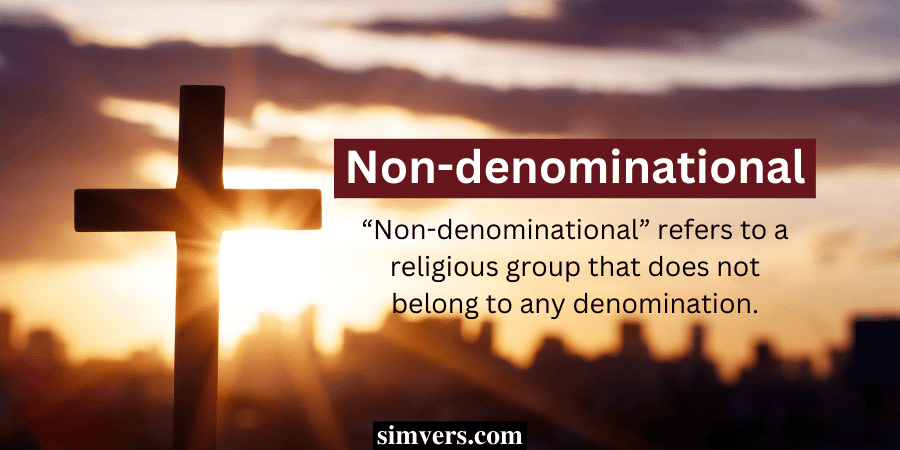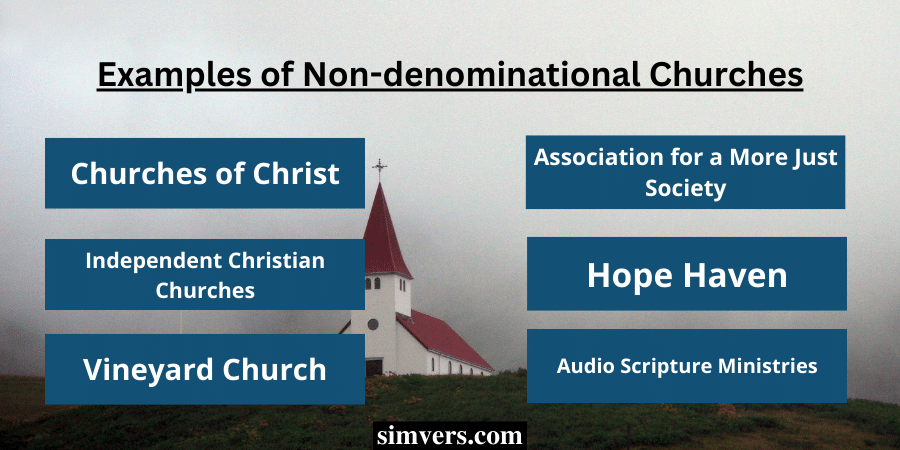
Christianity is a religion that has many denominations. “Denomination” refers to a branch of Christianity with distinct religious beliefs and practices.
For example, the Roman Catholic Church is one such denomination. The Eastern Orthodox Church and the Anglican Church are also examples.
But there are others, including many that are non-denominational. What exactly does it mean to be non-denominational? This article examines the term and discusses some examples of churches.
“Non-denominational” refers to a religious group that does not belong to any denomination. These churches include: Churches of Christ, Independent Christian Churches, Association for a More Just Society, Hope Haven.
Meaning of Non-Denominational

“Non-denominational” refers to a religious group that does not belong to any denomination. There are many non-denominational churches, including evangelical and charismatic congregations.
But most of them were formed when their members left another denomination. This is usually over theological differences. For example, some churches are non-denominational because an individual started their movement.
Others may be non-denominational because they have no affiliation with any religious organization.
Most of them have unique theologies. And the beliefs of their founders may have influenced them. But they don’t belong to a particular denomination.
These churches do not have official creeds or doctrines. This is because they’re independent and don’t want to limit their freedom.
Modern Growth of Non-Denominational Churches
The modern growth of non-denominational churches began in the 20th century. That was when many Protestant denominations were experiencing a decline in membership. Some congregations left their denominations and became independent.
Others merged with other like-minded churches.
Most Christians who are non-denominational use the Bible as their source of authority. But there are many interpretations of this. Some non-denominational churches have developed their creeds and doctrines.
Others remain Pentecostal or evangelical. Others have also been engaged in social and political issues. As a result, they become involved in politics.
MORE:
- Church True Meaning
- Bible about Circumcision
- Bible about Dinosaurs
- Disciple and apostle
- Do You Have To Be Baptized To Go To Heaven?
Examples of Non-Denominational Churches

This article has mentioned that a person or a small group usually founds these churches. They were unhappy with what they saw as the lack of biblical teaching and leadership in churches. They may also result from dissension within an existing church body.
Yes, there is no formal process for becoming non-denominational. But some examples have helped define this movement. These churches include:
Churches of Christ
These are a group of churches initially founded in the early 19th century. The Churches of Christ adhere to the principles laid out by their founders. The main idea behind these churches is that they believe only what is specified in Scripture.
They also believe that all Christians should be united under one ministry organization.
Independent Christian Churches
They adhere to the core teachings of the Restoration Movement. Independent Christian Churches are a group of churches not affiliated with any denomination. They hold to the basic tenets of Christianity and believe in Jesus Christ as the Son of God.
However, they do not accept any additional teachings that other denominations have added.
Association for a More Just Society
The Association for a More Just Society works to eliminate poverty in the United States. Three men who attended Bible college together started it. They wanted to form a ministry focusing on helping others.
They felt many churches were not doing enough to help those in need. So they created their mission-based ministry.
Hope Haven
Hope Haven works to improve the lives of individuals and families in need. A pastor founded the group. He wanted a place where people could come together.
They’ll receive help from volunteers and professionals who work in various fields.
Vineyard Church
The Vineyard Church provides many services to its members and the community. The church offers Sunday school programs, youth groups, and Bible studies. They also work with other churches in the area to help struggling people.
They have a food pantry for those in need. People can receive clothing items when they visit their facility, too.
Audio Scripture Ministries
Audio Scripture Ministries has a website offering free audio recordings of the Bible. They have recordings in over 100 languages. Their goal is to provide access to Scripture for people who cannot read it themselves.
The site provides information on how people can become involved with local churches.
Pros and Cons of Non-Denominational Churches
Non-denominational churches have both positive and negative aspects. Below are some pros and cons of non-denominational churches.
Pros
A non-denominational church can be a great place to find spiritual guidance. The congregation may have its own beliefs and practices. But it will usually welcome people from other faiths.
Non-denominational churches are often diverse. They provide many opportunities for people of different backgrounds to interact.
Cons
Non-denominational churches are small and have less money than larger, more established denominations. Suppose you’re looking for a church that can afford many programs and services. Then you may be disappointed in your search.
Conclusion
Non-denominational churches can be an excellent choice for people searching for spiritual guidance. You may feel more comfortable in one of these churches than in others.
When looking for a non-denominational church, always consider what kind of congregation you want.
Some people prefer large churches with established traditions. Others prefer smaller ones that are more flexible.
MORE:
- Old Testament vs New Testament
- Roman Catholic vs. Lutheran
- Roman Gods & Goddesses
- Bible about Suicide
- Best Order To Read The Bible
